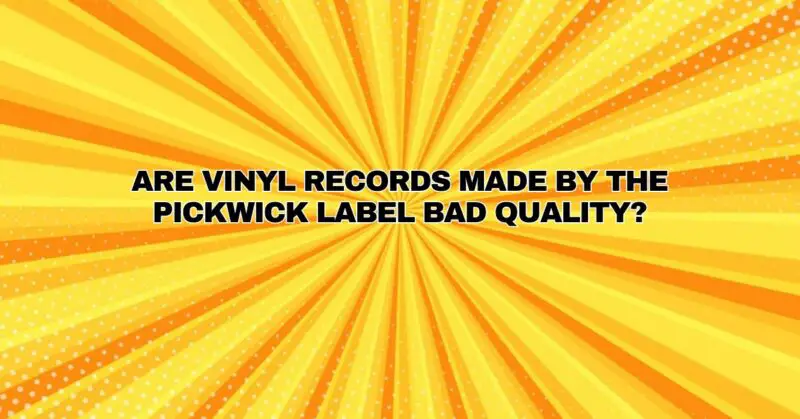The world of vinyl records is rich and diverse, with a wide range of labels producing records of varying quality. Among these labels, Pickwick Records has garnered a reputation for producing vinyl records that are sometimes perceived as lower in quality compared to releases from major labels. In this comprehensive article, we will explore the history of Pickwick Records, examine the factors contributing to their reputation, and determine whether their records deserve the label of “bad quality.”
The History of Pickwick Records
Pickwick Records, founded in 1950, was a subsidiary of Pickwick International, Inc. It was known for its budget-priced records and reissues of popular songs. The label gained prominence in the 1950s and 1960s by offering affordable vinyl records at a time when the medium was flourishing. Pickwick catered to a budget-conscious audience, making music accessible to a broader segment of the population.
Factors Contributing to Pickwick’s Reputation
Pickwick Records’ reputation for producing records of varying quality can be attributed to several factors:
1. Budget-Oriented Production: Pickwick Records aimed to keep production costs low, which sometimes led to the use of cheaper materials and manufacturing processes. This cost-cutting approach could result in records with less durability and lower sound quality.
2. Reissues and Compilation Albums: Pickwick was known for reissuing older recordings and creating compilation albums featuring various artists. These albums often included tracks from different sources and time periods, leading to inconsistent sound quality.
3. Non-standard Pressings: Some Pickwick releases were pressed using non-standard methods, which could affect sound quality and result in surface noise or other imperfections.
4. Lack of Attention to Quality Control: To keep prices low, Pickwick Records might not have placed the same emphasis on quality control as major labels did, leading to variations in the quality of their releases.
5. Varied Catalog: Pickwick Records had a vast and varied catalog, ranging from popular music to classical, jazz, and more. This diversity meant that the quality of their releases varied depending on the specific album or artist.
Evaluating Pickwick Records
It’s important to note that not all Pickwick Records releases are of uniformly poor quality. Some collectors and music enthusiasts have had positive experiences with certain Pickwick releases. The quality of a Pickwick record can depend on several factors:
1. Specific Release: The quality of a Pickwick record may vary depending on the specific release. Some albums may have been pressed with greater care or sourced from higher-quality recordings.
2. Condition: The condition of a Pickwick record, including its cleanliness, groove wear, and scratches, can greatly impact sound quality. Well-maintained records are more likely to provide a better listening experience.
3. Personal Preference: Sound quality is subjective, and what one listener perceives as subpar quality, another may find perfectly enjoyable. Personal preferences, equipment, and expectations all play a role in how a record is perceived.
Conclusion
While Pickwick Records earned a reputation for producing budget-oriented records of varying quality, it’s important to recognize that not all of their releases should be labeled as “bad quality.” The perception of Pickwick Records is influenced by factors such as production practices, reissues, and individual releases. Moreover, what one person considers subpar quality, another may appreciate for its accessibility and affordability.
When evaluating a Pickwick record or any vinyl release, it’s essential to consider factors like the specific release, its condition, and personal listening preferences. Ultimately, the world of vinyl records is diverse, and while Pickwick Records may not have consistently produced audiophile-quality releases, they have played a significant role in making music accessible to a broader audience, contributing to the enduring appeal of vinyl as a medium for music enjoyment.


